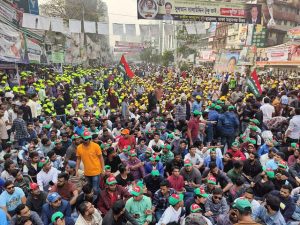On January 30, the International Monetary Fund (IMF) approved a $4.7 billion loan to Bangladesh, aimed at “creating fiscal space to enable greater social and developmental spending; strengthening the financial sector; modernizing policy frameworks; and building climate resilience.” It will receive $3.3 billion of this under the Extended Credit Facility and the Extended Fund Facility, and $1.4 billion under the Resilience and Sustainability Facility. The 42-month loan is designed to help preserve macroeconomic stability, protect the vulnerable, and foster inclusive and green growth.
Once dismissed by Henry Kissinger as a “basket case,” Bangladesh had in recent years emerged as South Asia’s rising star, prompting businessmen visiting the country to describe it as the tiger of Asia. As the head of a German business delegation observed in 2020, Bangladesh’s economy was “extremely dynamic.” It had grown by 8.13 percent the previous year.
Bangladesh built upon the growth of the garment industry and foreign remittances to transition to the status of a middle-income economy.
However, trouble struck with the pandemic and the Russian invasion of Ukraine, and Dhaka is now grappling with multiple challenges of geopolitical competition, a shortage of foreign currency, and political unrest.
Bangladesh’s foreign exchange reserves have fallen from a record $48.09 billion on September 1, 2021 – the highest ever in its history – to $32.7 billion on January 2 this year. Of this, around $8.5 billion has been set aside for the Export Development Fund (EDF) under which Bangladesh has extended loans to Maldives and Sri Lanka, which means that it has only $24 billion as usable currency. Additionally, some of the dollar reserves are held in the form of investments in U.S. treasury bonds and gold reserves. Consequently, the country is facing a serious forex crisis.
This has in turn thrown up other problems, as the government has cut down on imports.
Also, the value of the Bangladeshi taka has fallen by over 25 percent against the U.S. dollar over the past six months. Inflation has risen by 9 percent.
One of the conditions of the IMF loan is that Bangladesh will need to reduce subsidies, which will ultimately accelerate inflation. Fuel prices have already increased by over 50 percent, and gas prices by over 150 percent for industries.
Bangladesh’s external foreign debt is rising too, touching a high of about $100 billion in February. The economy could face a major shock between 2024 and 2026 when it will have to repay loans owed to foreign creditors for 20 mega projects.
The AL government promoted the mega projects with the slogan, “More Development, Less Democracy” to justify its undermining of democracy. The economic crisis has damaged the claims the slogan made. The AL has given the people neither democracy nor development.
Since the restoration of Bangladesh’s democracy in 1991, political power has alternated between the Bangladesh Nationalist Party (BNP) and the Awami League (AL). However, since January 2009 the AL has remained in power, largely because of the manipulation of elections, prompting the U.S. to express “disappointment” in the 2018 election. The AL government has been accused of rampant human rights abuses, forced disappearances, extra-judicial killings, and marginalization of the political opposition as well, leading to the U.S. imposing sanctions on officials of Bangladesh’s Rapid Action Battalion.
The economic crisis has energized the opposition BNP to mobilize its supporters and the public against the AL government. They successfully held rallies across the country, with tens of thousands of people participating. Amid the crumbling economic situation, the BNP is mobilizing people with an eye on general elections that are to be held in December 2023.
One would have thought that Bangladesh’s development partners – the United States, Japan, China, and Russia – would extend it a helping hand amid the economic crisis. Instead, they have been busy waging their geopolitical rivalries in the country. In recent weeks, Bangladesh has witnessed a flurry of high-level visits from the U.S. and China. Russia and the U.S. have been accusing each other of interfering in Bangladesh’s internal affairs. For instance, Russian Foreign Ministry Spokesperson Maria Zakharova criticized the U.S. Ambassador in Dhaka Peter D. Haas for “persistently trying to influence the domestic processes in the country.”
Even as Bangladesh battles a serious economic crisis and political unrest, there is little support forthcoming from its development partners.

































